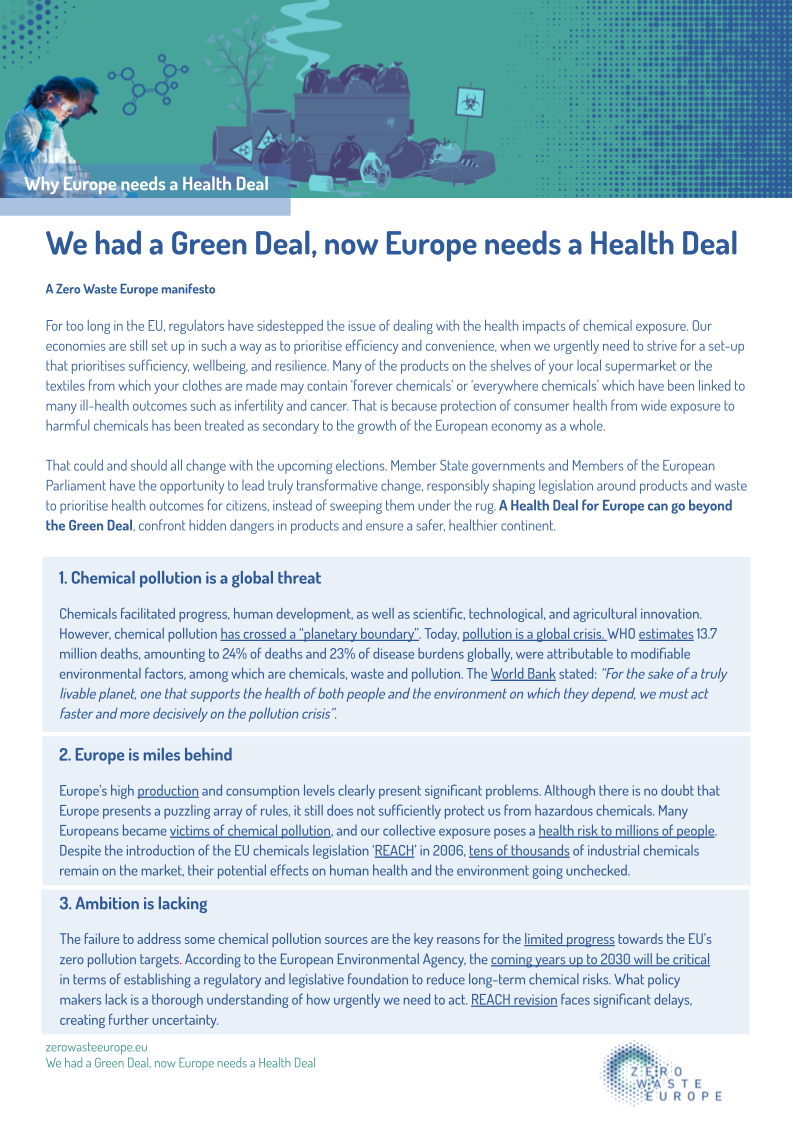
For too long in the EU, regulators have sidestepped the issue of dealing with the health impacts of chemical exposure. Our economies are still set up in such a way as to prioritise efficiency and convenience, when we urgently need to strive for a set-up that prioritises sufficiency, wellbeing, and resilience. Member State governments and Members of the European Parliament have the opportunity to lead truly transformative change, responsibly shaping legislation around products and waste to prioritise health outcomes for citizens, instead of sweeping them under the rug. This is Zero Waste Europe’s manifesto for a health deal for Europe – which goes beyond the Green Deal to confront hidden dangers in products and ensure a safer, healthier continent.
Available in English.
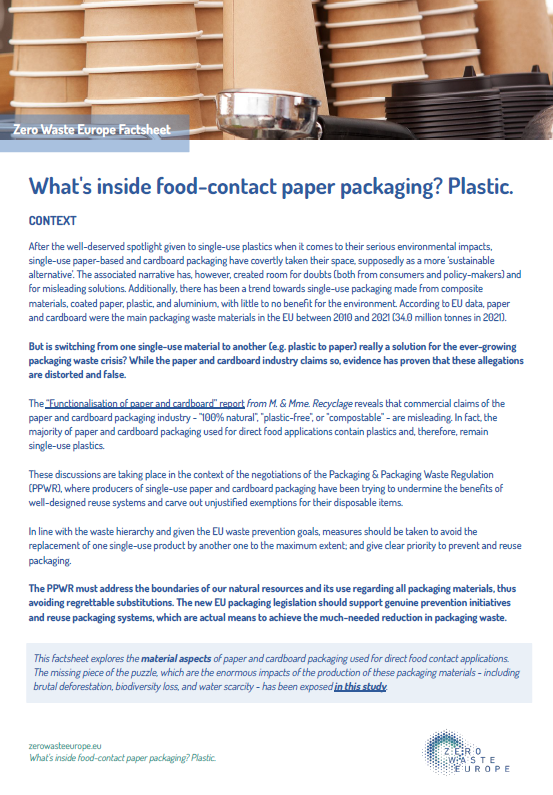
After the well-deserved spotlight given to single-use plastics when it comes to their serious environmental impacts, single-use paper-based and cardboard packaging have covertly taken their space, supposedly as a more ‘sustainable alternative’. The associated narrative has, however, created room for doubts (both from consumers and policy-makers) and for misleading solutions But is switching from one single-use material to another (e.g. plastic to paper) really a solution for the ever-growing packaging waste crisis? While the paper and cardboard industry claims so, evidence has proven that these allegations are distorted and false.
This joint factsheet by Zero Waste Europe, #breakfreefromplastic, Deutsche Umwelthilfe (DUH), the Environmental Paper Network (EPN), Recycling Netwerk Benelux (RNB), and the Rethink Plastic alliance explores the material aspects of paper and cardboard packaging used for direct food contact applications – including, among others, the findings from the “Functionalisation of Paper and Cardboard” report by M.+Me Recyclage.
Available in English, Lithuanian, and Portuguese.
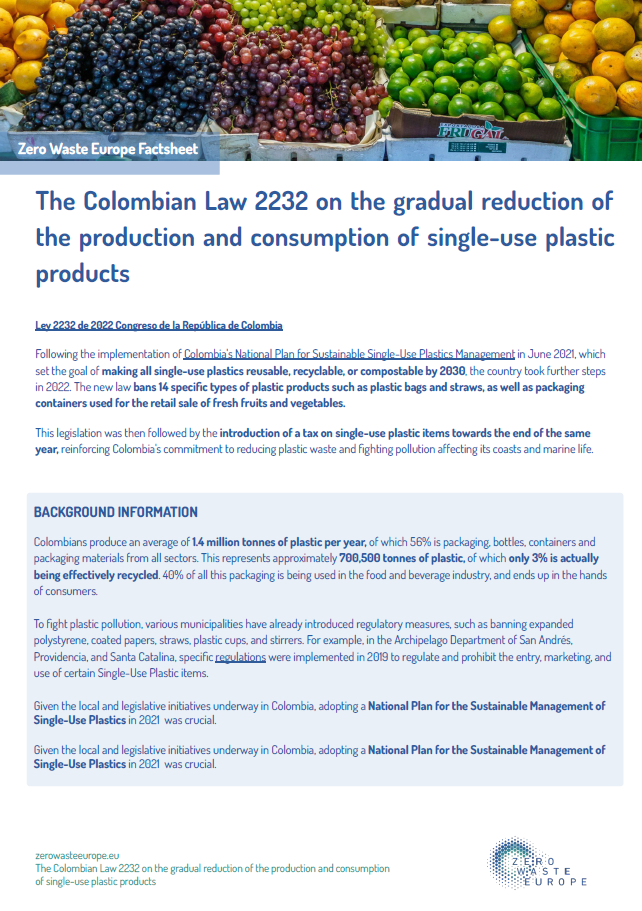
In 2022, Colombia took further steps to strengthen the implementation of its National Plan for Sustainable Single-Use Plastics Management. The country has set the goal of making all single-use plastics reusable, recyclable, or compostable by 2030.
As part of our activities for the 2023 European Week of Waste Reduction, this factsheet analyses Colombia’s Law 2232 on the gradual reduction of the production and consumption of single-use plastic products. The new law bans 14 specific types of plastic products such as plastic bags and straws, as well as packaging containers used for the retail sale of fresh fruits and vegetables.
Available in English.
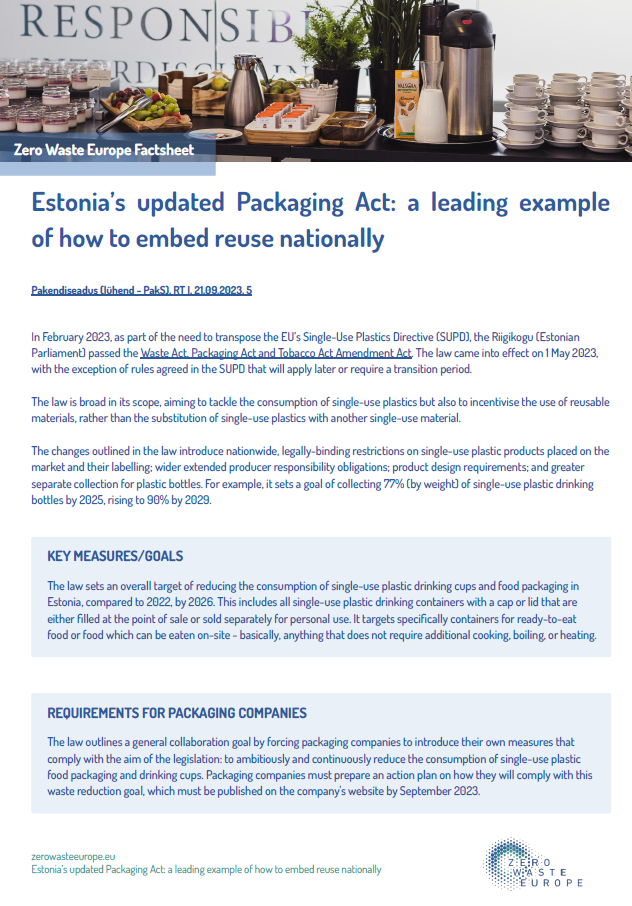
In February 2023, as part of the need to transpose the EU’s Single-Use Plastics Directive (SUPD), the Riigikogu (Estonian Parliament) passed the Waste Act, Packaging Act and Tobacco Act Amendment Act. The law came into effect on 1 May 2023, with the exception of rules agreed in the SUPD that will apply later or require a transition period.
As part of our activities for the 2023 European Week of Waste Reduction, this factsheet lays out Estonia’s measures to implement the SUPD nationally – from binding actions for packaging companies to mandatory reuse items in public events.
Available in English.
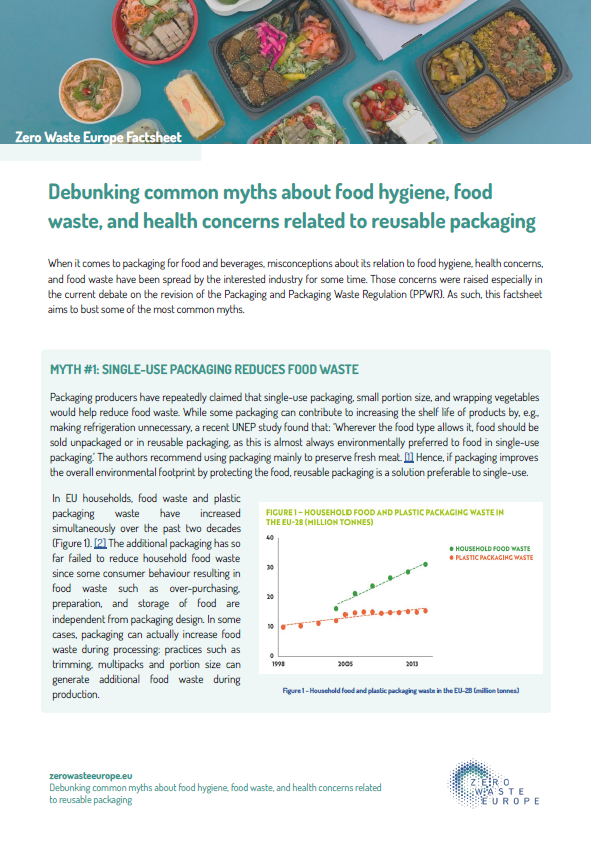
When it comes to packaging for food and beverages, misconceptions about its relation to food hygiene, health concerns, and food waste have been spread by the interested industry for some time. Those concerns were raised especially in the current debate on the revision of the Packaging and Packaging Waste Regulation (PPWR). As such, this factsheet aims to bust some of the most common myths.
Available in English, Estonian, French, Hungarian, Montenegrin, Latvian, and Slovenian.
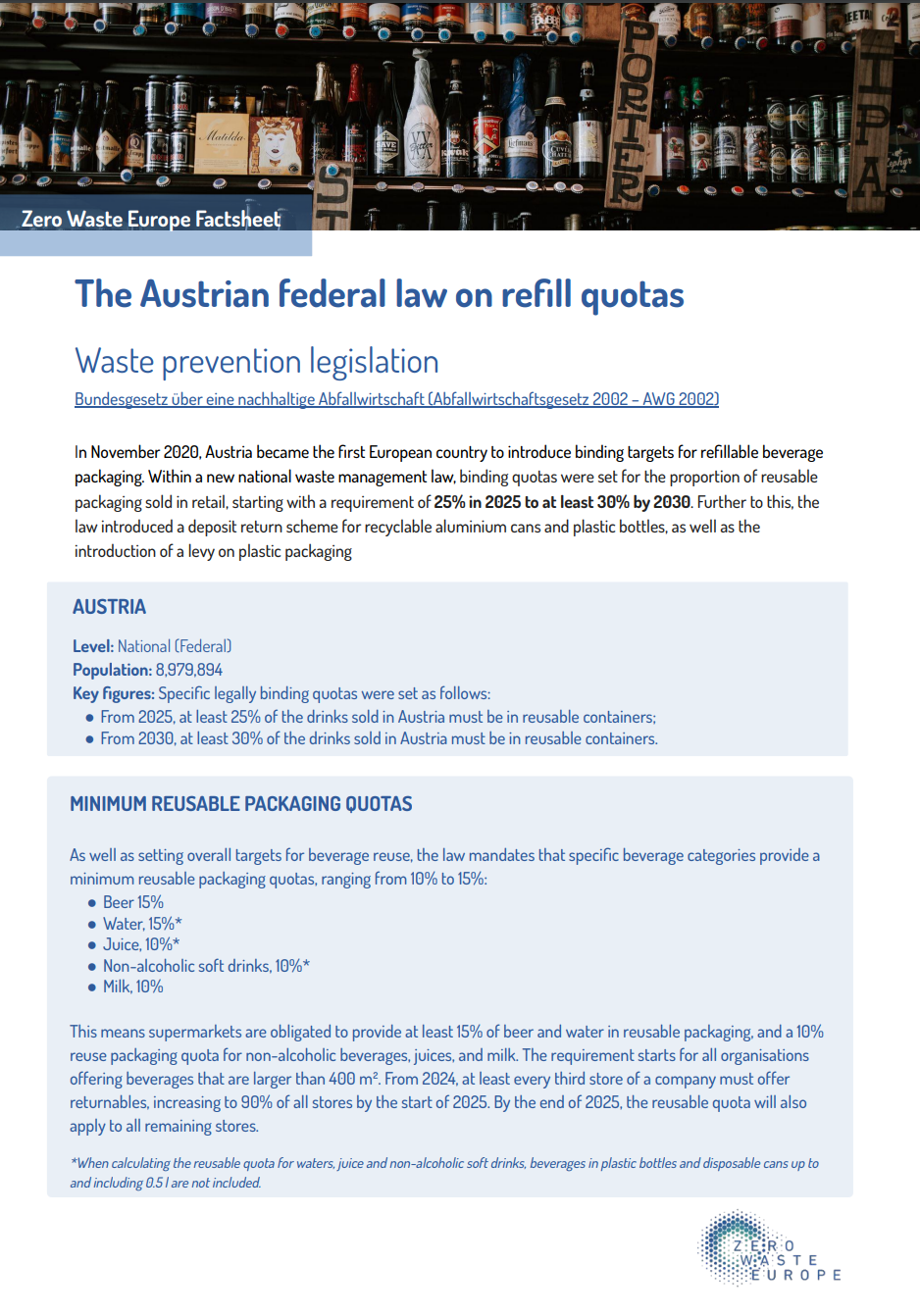
In November 2020, Austria became the first European country to introduce binding targets for refillable beverage packaging. Within a new national waste management law, binding quotas were set for the proportion of reusable packaging sold in retail, starting with a requirement of 25% in 2025 to at least 30% by 2030.
On the occasion of the European Week of Waste Reduction 2023, our factsheet takes a closer look at Austria’s inspiring work on refillable beverage packaging.
Available in English.
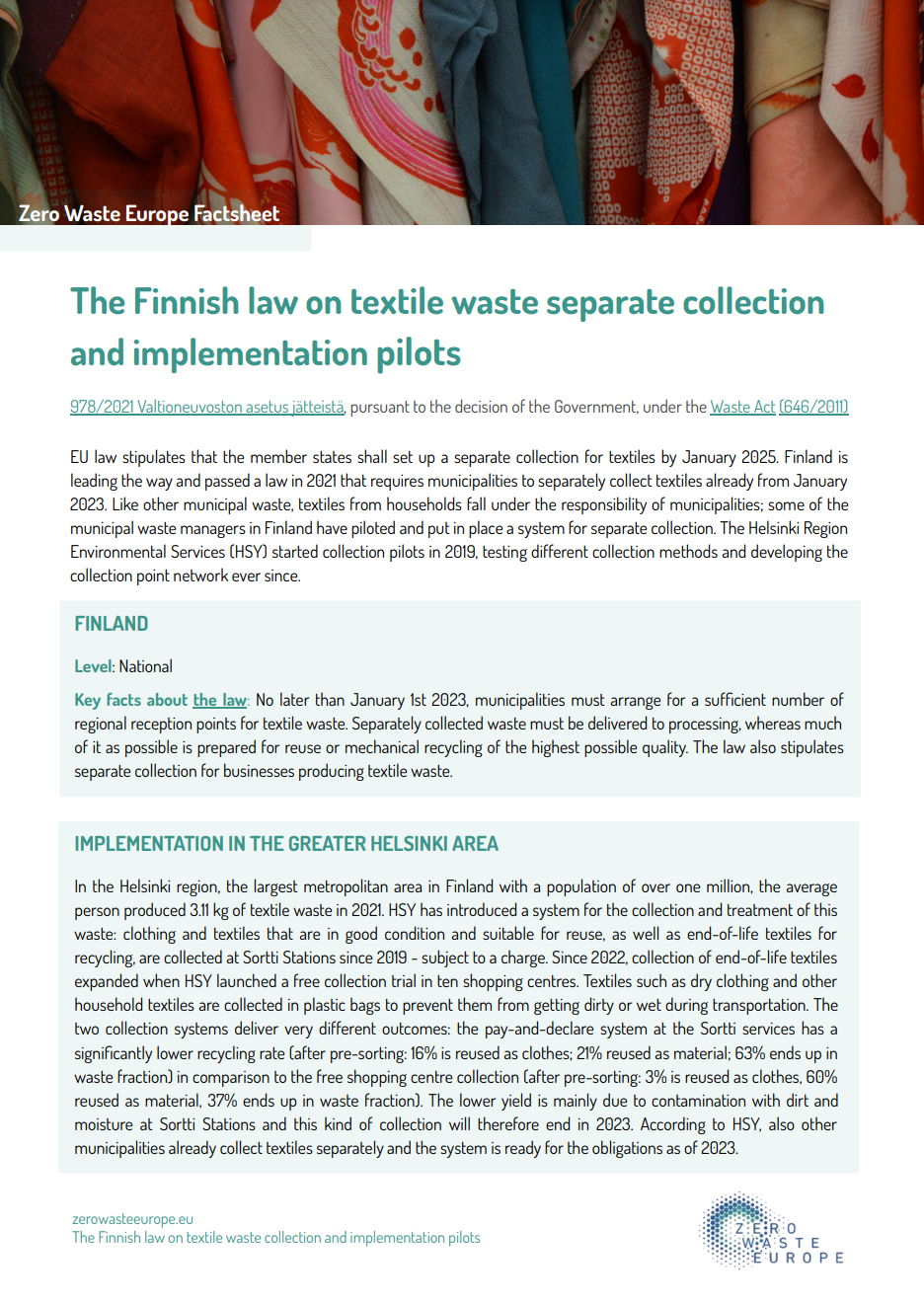
EU law stipulates that the member states shall set up a separate collection for textiles by January 2025. Finland is leading the way and passed a law in 2021 that requires municipalities to separately collect textiles already from January 2023.
On the occasion of the European Week of Waste Reduction 2023, our factsheet takes a closer look at Finland’s leading work on textile waste.
Available in English, Portuguese and Hungarian.
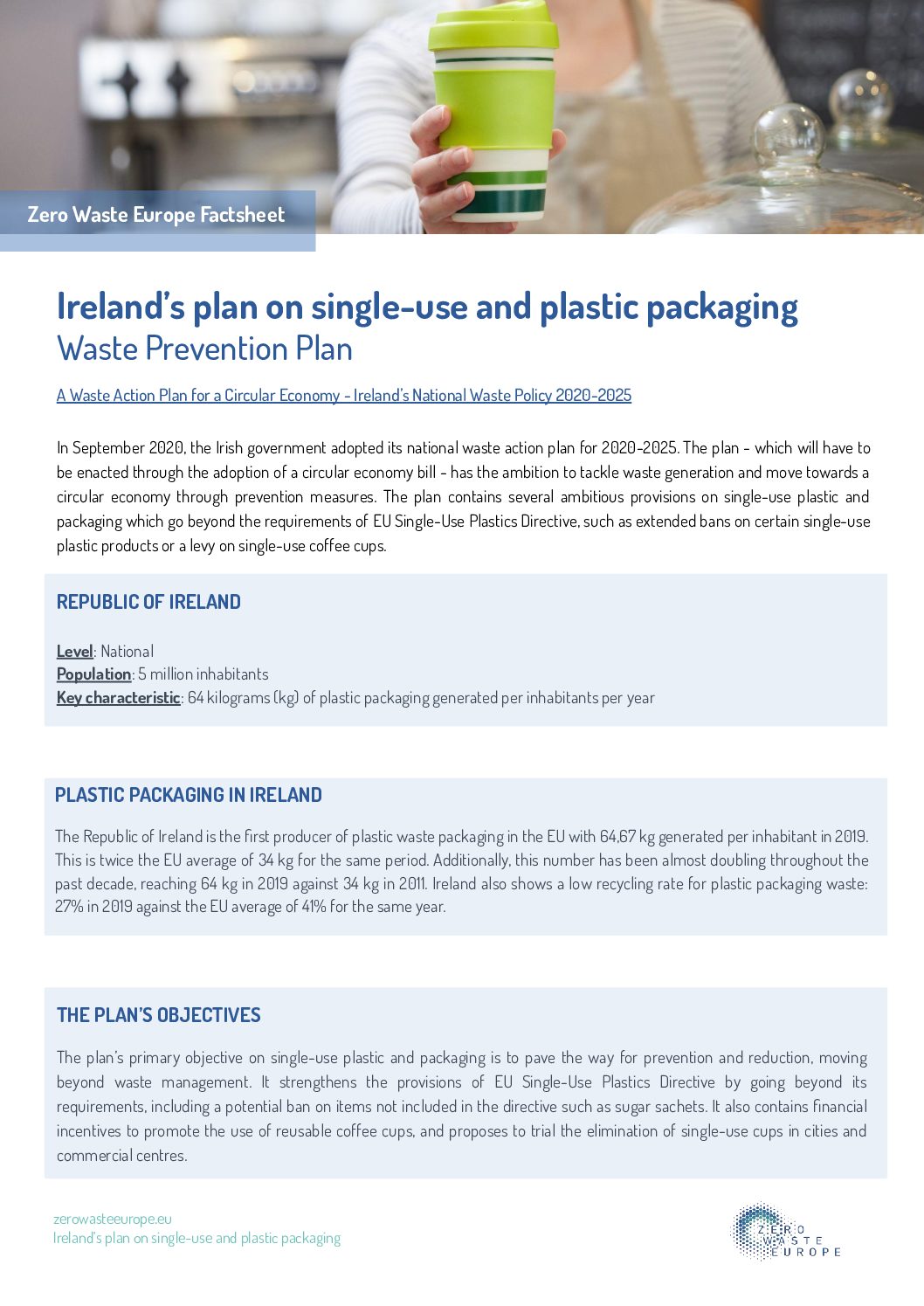
In September 2020, the Irish government adopted its national waste action plan for 2020-2025. The plan – which will have to be enacted through the adoption of a circular economy bill – has the ambition to tackle waste generation and move towards a circular economy through prevention measures. The plan contains several ambitious provisions on single-use plastic and packaging which go beyond the requirements of EU Single-Use Plastics Directive,bsuch as extended bans on certain single-use plastic products or a levy on single-use coffee cups.
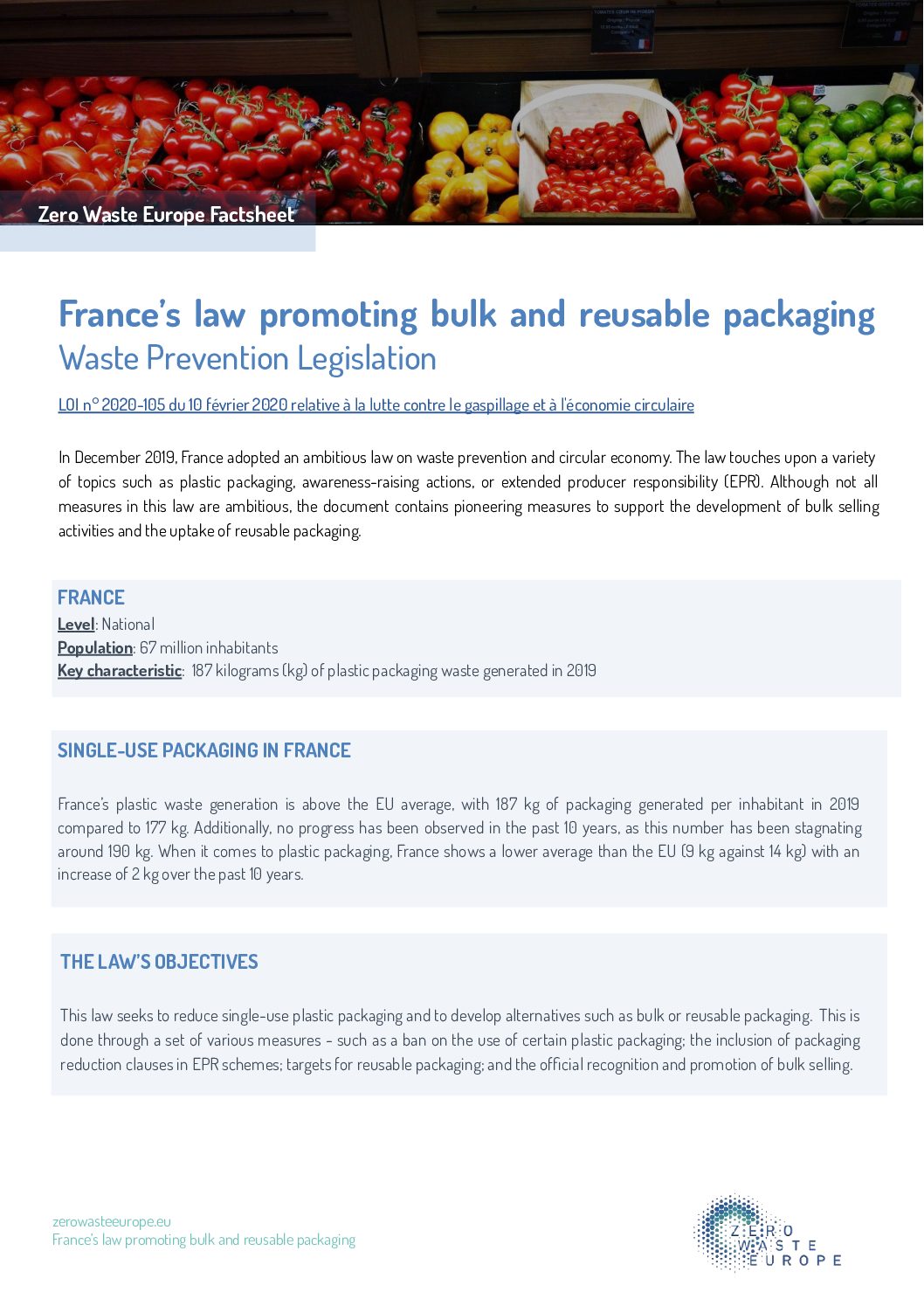
In December 2019, France adopted an ambitious law on waste prevention and circular economy. The law touches upon a variety of topics such as plastic packaging, awareness-raising actions, or extended producer responsibility (EPR). Although not all measures in this law are ambitious, the document contains pioneering measures to support the development of bulk selling activities and the uptake of reusable packaging.
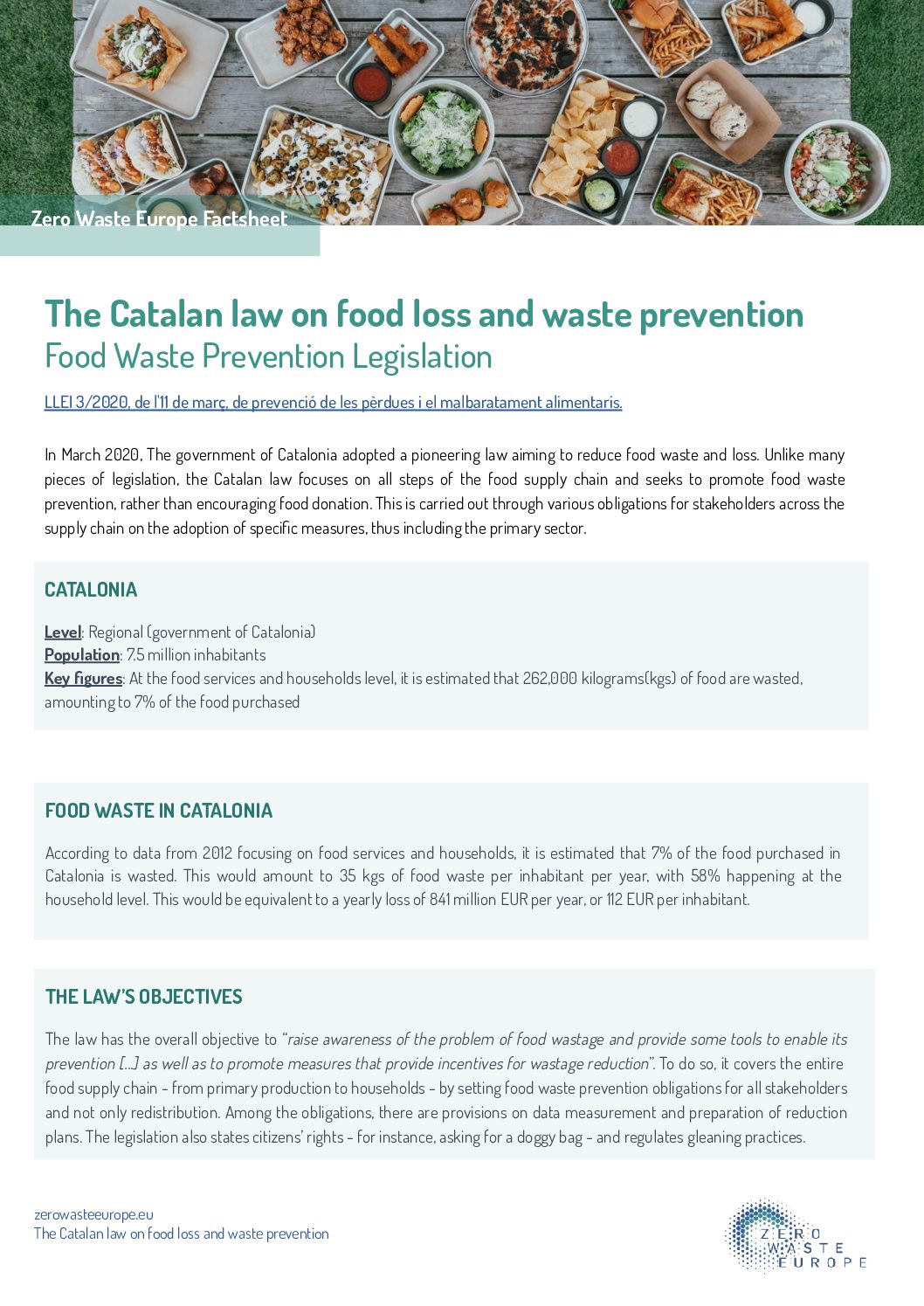
In March 2020, The government of Catalonia adopted a pioneering law aiming to reduce food waste and loss. Unlike many pieces of legislation, the Catalan law focuses on all steps of the food supply chain and seeks to promote food waste prevention, rather than encouraging food donation. This is carried out through various obligations for stakeholders across the supply chain on the adoption of specific measures, thus including the primary sector.
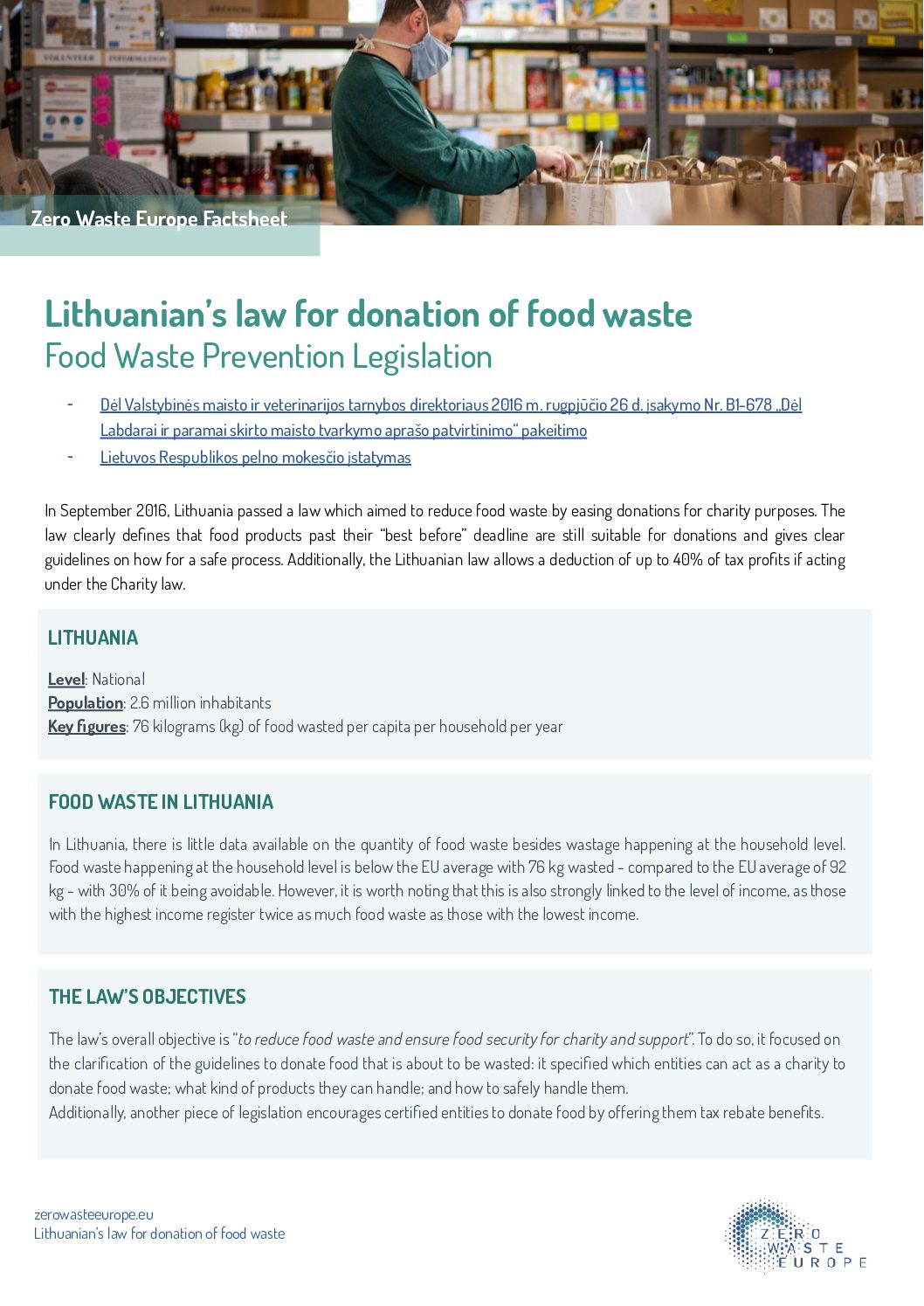
In September 2016, Lithuania passed a law that aimed to reduce food waste by easing donations for charity purposes. The law clearly defines that food products past their “best before” deadline are still suitable for donations and gives clear guidelines on how for a safe process. Additionally, the Lithuanian law allows a deduction of up to 40% of tax profits if acting under the Charity law.
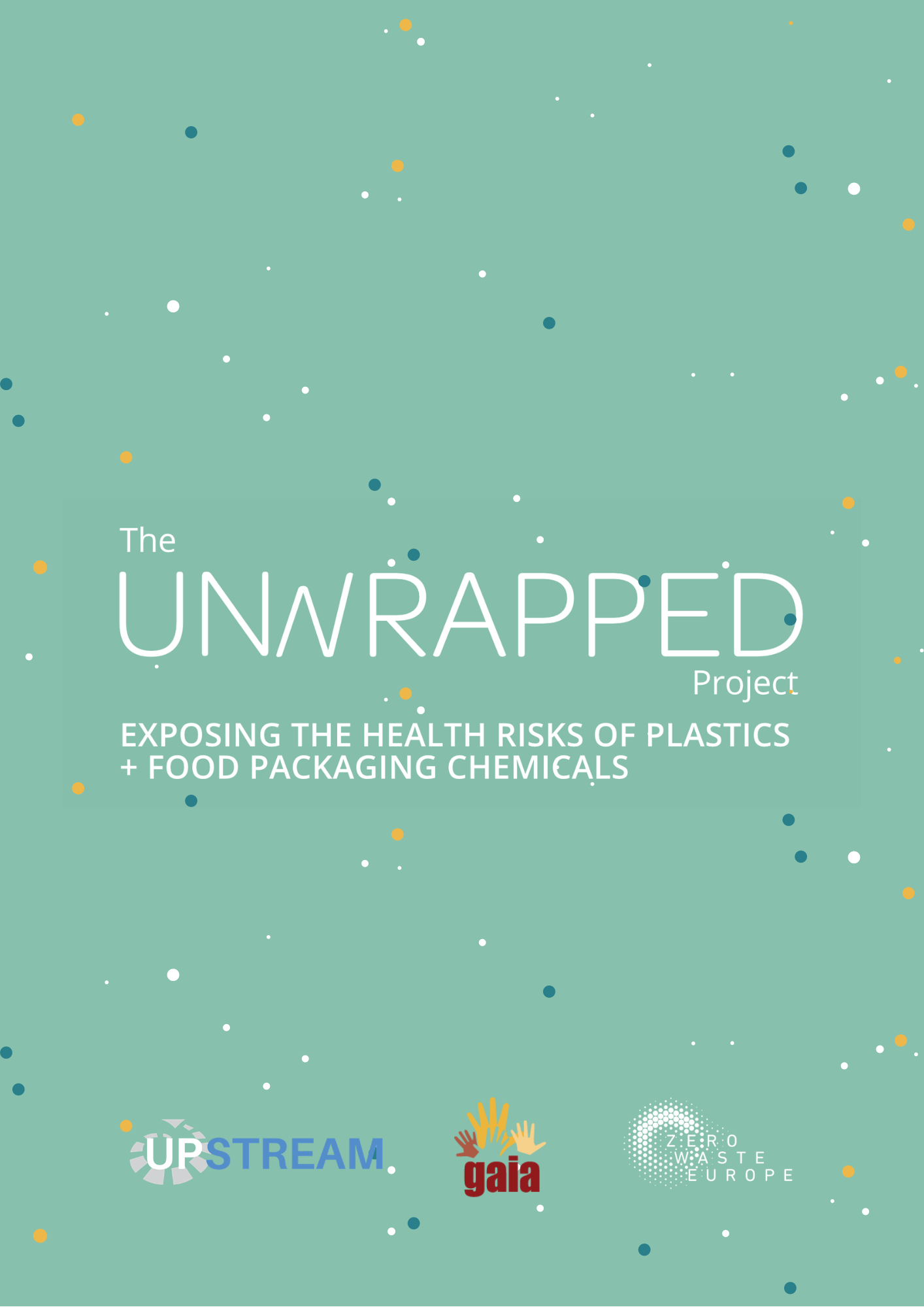
As part of the UNWRAPPED Project, we have developed a toolkit to throw a spotlight on the human health risks posed by plastics and other food packaging materials. The 9 factsheets present facts and figures about how disposable food packaging can be harmful to human health and call for corporate and decision-makers to put an end to single-use packaging and take a precautionary approach to use harmful chemicals that are known to migrate out of packaging and cause human health impacts.
Available in English (other languages are coming soon)!
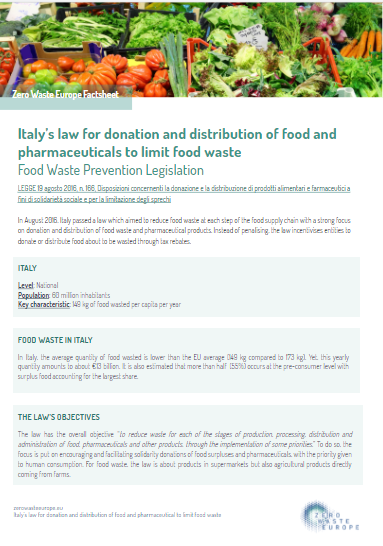
In August 2016, Italy passed a law which aimed to reduce food waste at each step of the food supply chain with a strong focus on donation and distribution of food waste and pharmaceutical products. Instead of penalising, the law incentivises entities to donate or distribute food about to be wasted through tax rebates. Read more in our factsheet.
Available in English, Hungarian and Italian.
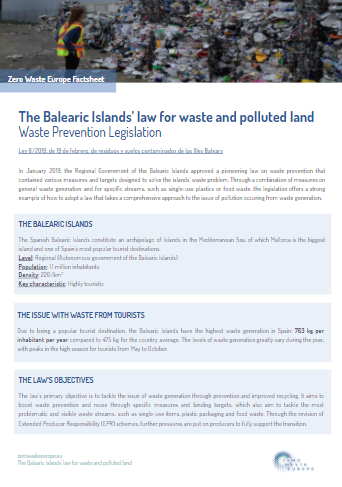
In January 2019, the Regional Government of the Balearic Islands approved a pioneering law on waste prevention that contained various measures and targets designed to solve the islands’ waste problem. Through a combination of measures on general waste generation and for specific streams, such as single-use plastics or food waste, the legislation offers a strong example of how to adopt a law that takes a comprehensive approach to the issue of pollution occuring from waste generation. Read more in our factsheet.
Available in English, Hungarian and Italian.
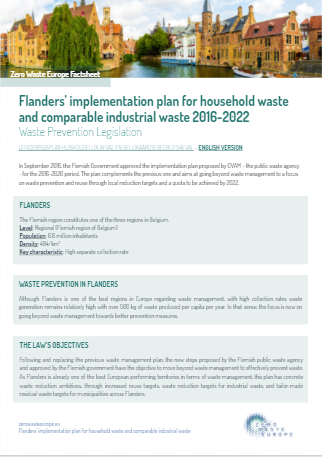
In September 2016, the Flemish Government approved the implementation plan proposed by OVAM – the public waste agency – for the 2016-2020 period. The plan complements the previous one and aims at going beyond waste management to a focus on waste prevention and reuse through local reduction targets and a quota to be achieved by 2022. Read more in our factsheet.
Available in English, Hungarian and Italian.
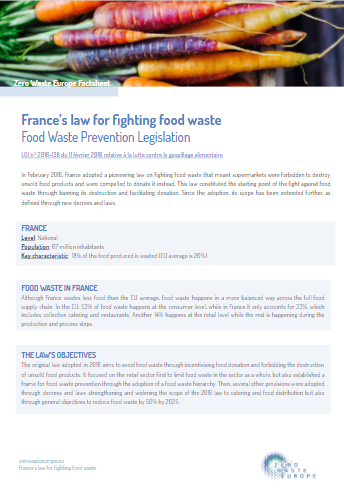
In February 2016, France adopted a law on fighting food waste that meant supermarkets were forbidden to destroy unsold food products and were compelled to donate it instead. This law constituted the starting point of the fight against food waste through banning its destruction and facilitating donation. Since the adoption, its scope has been extended further, as defined through new decrees and laws. Read more in our factsheet.
Available in English, Hungarian and Italian.















